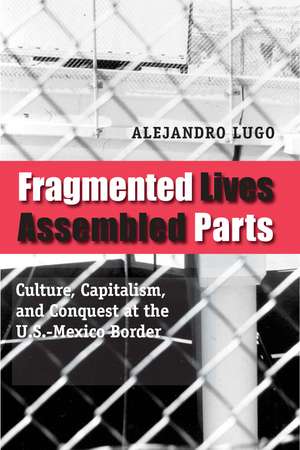Fragmented Lives, Assembled Parts: Culture, Capitalism, and Conquest at the U.S.-Mexico Border
Autor Alejandro Lugoen Limba Engleză Paperback – aug 2008
Association of Latina and Latino Anthropologists Book Award, 2009
Established in 1659 as Misión de Nuestra Señora de Guadalupe de los Mansos del Paso del Norte, Ciudad Juárez is the oldest colonial settlement on the U.S.-Mexico border-and one of the largest industrialized border cities in the world. Since the days of its founding, Juárez has been marked by different forms of conquest and the quest for wealth as an elaborate matrix of gender, class, and ethnic hierarchies struggled for dominance. Juxtaposing the early Spanish invasions of the region with the arrival of late-twentieth-century industrial "conquistadors," Fragmented Lives, Assembled Parts documents the consequences of imperial history through in-depth ethnographic studies of working-class factory life.
By comparing the social and human consequences of recent globalism with the region's pioneer era, Alejandro Lugo demonstrates the ways in which class mobilization is itself constantly being "unmade" at both the international and personal levels for border workers. Both an inside account of maquiladora practices and a rich social history, this is an interdisciplinary survey of the legacies, tropes, economic systems, and gender-based inequalities reflected in a unique cultural landscape. Through a framework of theoretical conceptualizations applied to a range of facets—from multiracial "mestizo" populations to the notions of border "crossings" and "inspections," as well as the recent brutal killings of working-class women in Ciudad Juárez—Fragmented Lives, Assembled Parts provides a critical understanding of the effect of transnational corporations on contemporary Mexico, calling for official recognition of the desperate need for improved working and living conditions within this community.
Preț: 262.40 lei
Nou
Puncte Express: 394
Preț estimativ în valută:
50.21€ • 52.56$ • 41.55£
50.21€ • 52.56$ • 41.55£
Carte tipărită la comandă
Livrare economică 07-21 aprilie
Preluare comenzi: 021 569.72.76
Specificații
ISBN-13: 9780292717671
ISBN-10: 0292717679
Pagini: 339
Ilustrații: 29 b&w illustrations
Dimensiuni: 152 x 229 x 23 mm
Greutate: 0.45 kg
Editura: University of Texas Press
Colecția University of Texas Press
ISBN-10: 0292717679
Pagini: 339
Ilustrații: 29 b&w illustrations
Dimensiuni: 152 x 229 x 23 mm
Greutate: 0.45 kg
Editura: University of Texas Press
Colecția University of Texas Press
Notă biografică
Alejandro Lugo is Associate Professor of Anthropology and Latina/Latino Studies at the University of Illinois at Urbana-Champaign. He is the co-editor (with Bill Maurer) of Gender Matters: Rereading Michelle Rosaldo.
Cuprins
- Acknowledgments
- Chapter 1. Introduction
- Part I. Sixteenth-Century Conquests (1521-1598) and their Postcolonial Border Legacies
- Chapter 2. The Invention of Borderlands Geography: What Do Aztlán and Tenochtitlán Have to Do with Ciudad Juárez/Paso del Norte?
- Chapter 3. The Problem of Color in Mexico and on the U.S.-Mexico Border: Precolonial, Colonial, and Postcolonial Subjectivities
- Part II. Culture, Class, and Gender in Late-Twentieth-Century Ciudad Juárez
- Chapter 4. Maquiladoras, Gender, and Culture Change
- Chapter 5. The Political Economy of Tropes, Culture, and Masculinity Inside an Electronics Factory
- Chapter 6. Border Inspections: Inspecting the Working-Class Life of Maquiladora Workers on the U.S-Mexico Border
- Chapter 7. Culture, Class, and Union Politics: The Daily Struggle for Chairs inside a Sewing Factory in the Larger Context of the Working Day
- Chapter 8. Women, Men, and "Gender" in Feminist Anthropology: Lessons from Northern Mexico's Maquiladoras
- Part III. Alternating Imaginings
- Chapter 9. Reimagining Culture and Power against Late Industrial Capitalism and Other Forms of Conquest through Border Theory and Analysis
- Epilogue
- Notes
- Bibliography
- Permissions Credits
- Index
Descriere
A compelling ethnographic examination of global capitalism's impact, colonial and post-colonial, in Mexico's Ciudad Juárez.




